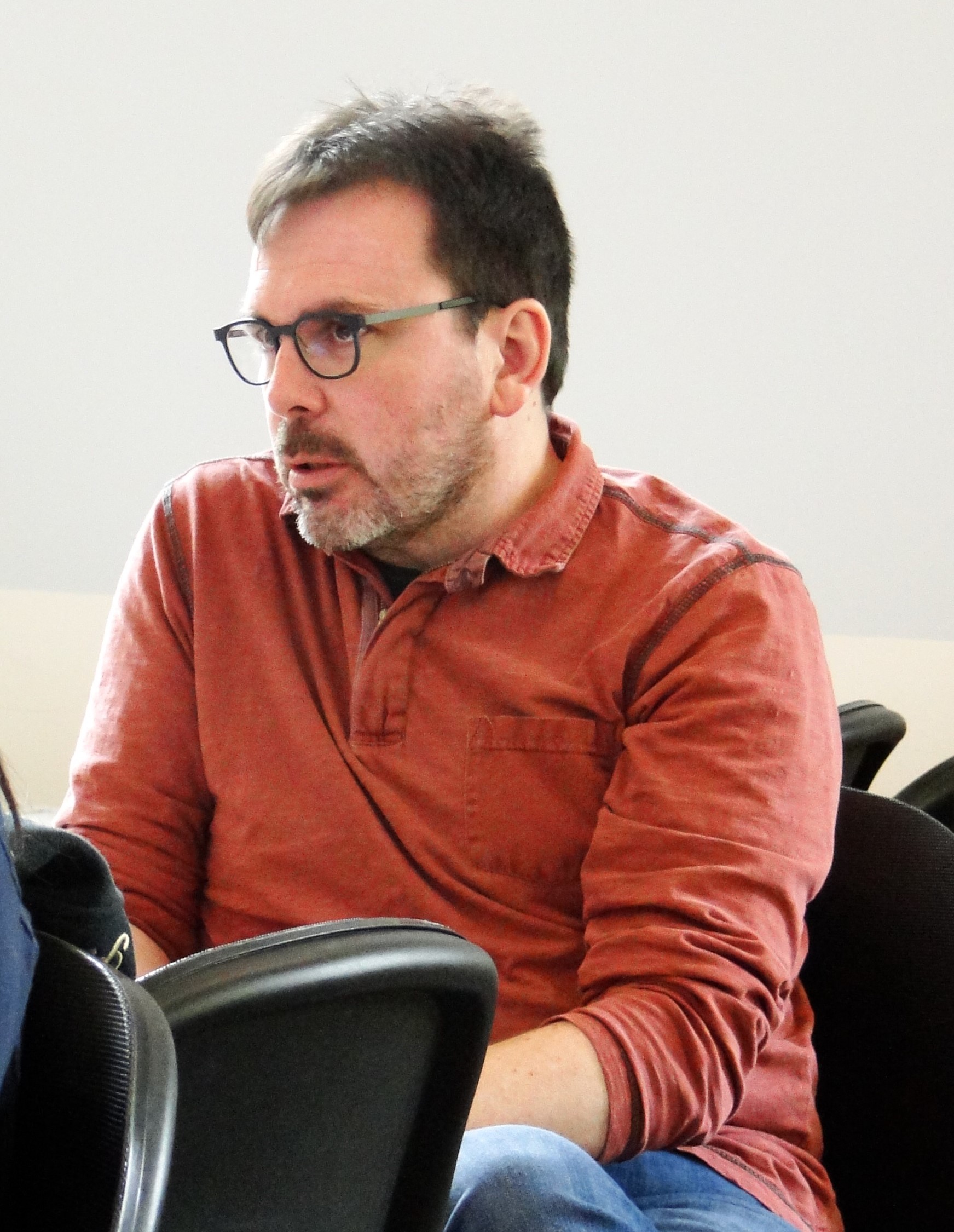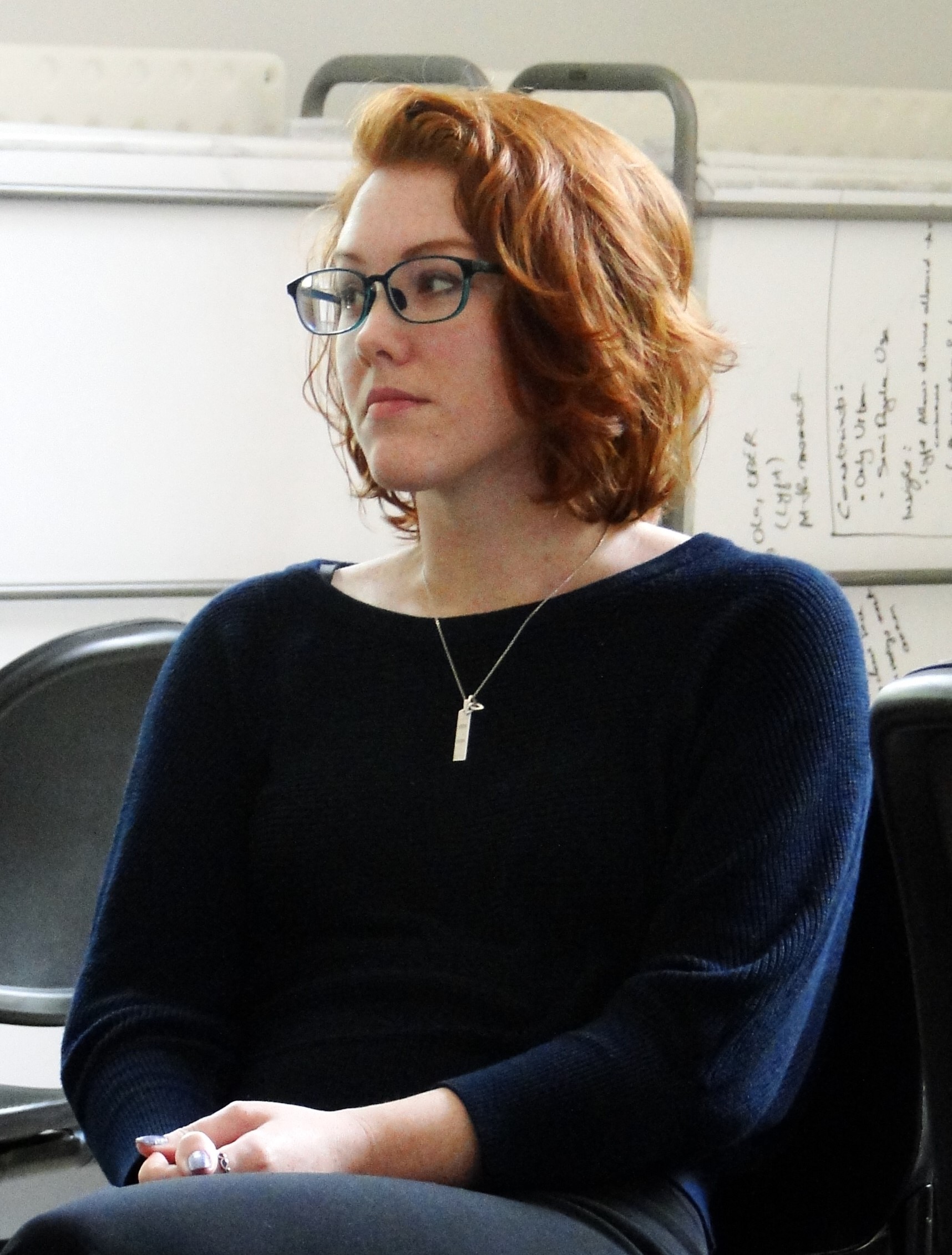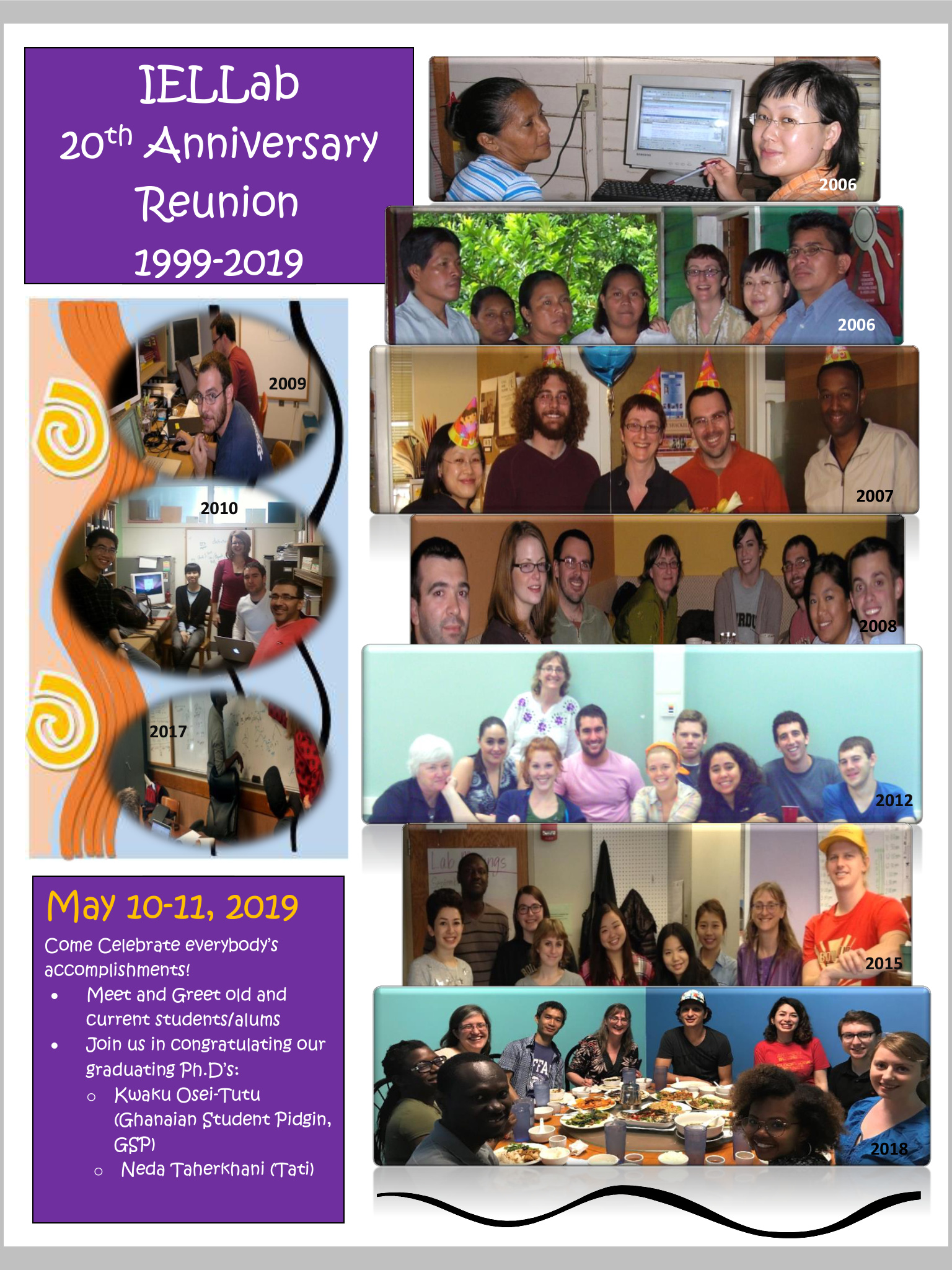
This year (2019) two members of the lab (Kwaku Osei-Tutu and Neda Taherkhani) graduated with Ph.D's and this happy occasion coincided with 20th Anniversary of the lab. Consequently, a series of events were held to celebrate -- May 10, 2019 (graduation ceremony and party for the graduands) and May 11, 2019 (a mini-conference for past and current members of the lab to present their work). Here is a group photo of the attendees.
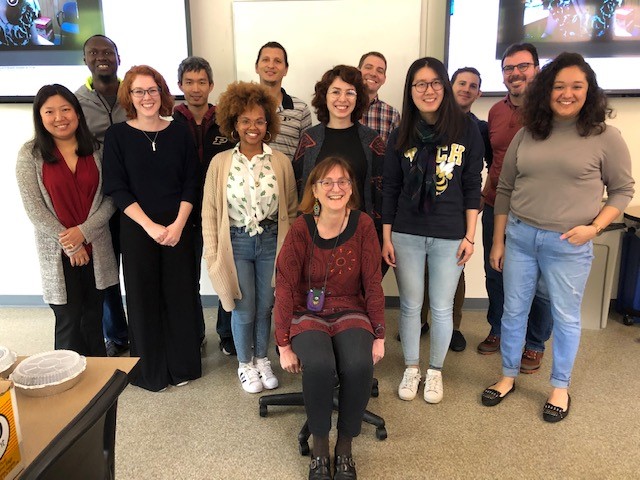 Seated: Elena Benedicto; First Row (Left-to-Right): Sunny Park-Johnson, Amelia Shettle Mena, Brittlea Jernigan-Hardrick, Neda Taherkhani, Xuan Hu, Jessica González; Second Row (Left-to-Right): Kwaku Osei-Tutu, Pin-Hsi Chen, René Zúñiga Argüello, Jason Overfelt, Ethan Myers, Ricard Viñas-de-Puig. Also present was Matthew Ball (who is not in this picture).
Seated: Elena Benedicto; First Row (Left-to-Right): Sunny Park-Johnson, Amelia Shettle Mena, Brittlea Jernigan-Hardrick, Neda Taherkhani, Xuan Hu, Jessica González; Second Row (Left-to-Right): Kwaku Osei-Tutu, Pin-Hsi Chen, René Zúñiga Argüello, Jason Overfelt, Ethan Myers, Ricard Viñas-de-Puig. Also present was Matthew Ball (who is not in this picture).
Mini-Conference
The presenters, their papers and a short bio of each presenter are provided below.
Ricard Viñas-de-Puig
Ricard Viñas-de-Puig (PhD, Purdue University, 2009) is an Assistant Professor in the Department of Hispanic Studies at the College of Charleston, where he teaches linguistics classes (for the the Spanish Major and the Linguistics Minor) and Spanish language classes. His research interests focus on argument structure (stemming from his dissertation on experience predicates in Catalan and Mayangna), morphosyntactic analysis of various linguistic features on different contact varieties on both sides of the Atlantic (e.g., expletive negation in Catalonian Spanish, clitic doubling constructions in Eastern Carolina Spanish, leísmo and other clitic phenomena in in Yagua Spanish, a variety of Spanish in contact with Yagua, an indigenous language of the Peruvian Amazon), and the survey and promotion of immigrant indigenous languages in the Carolinas.
Jason Overfelt
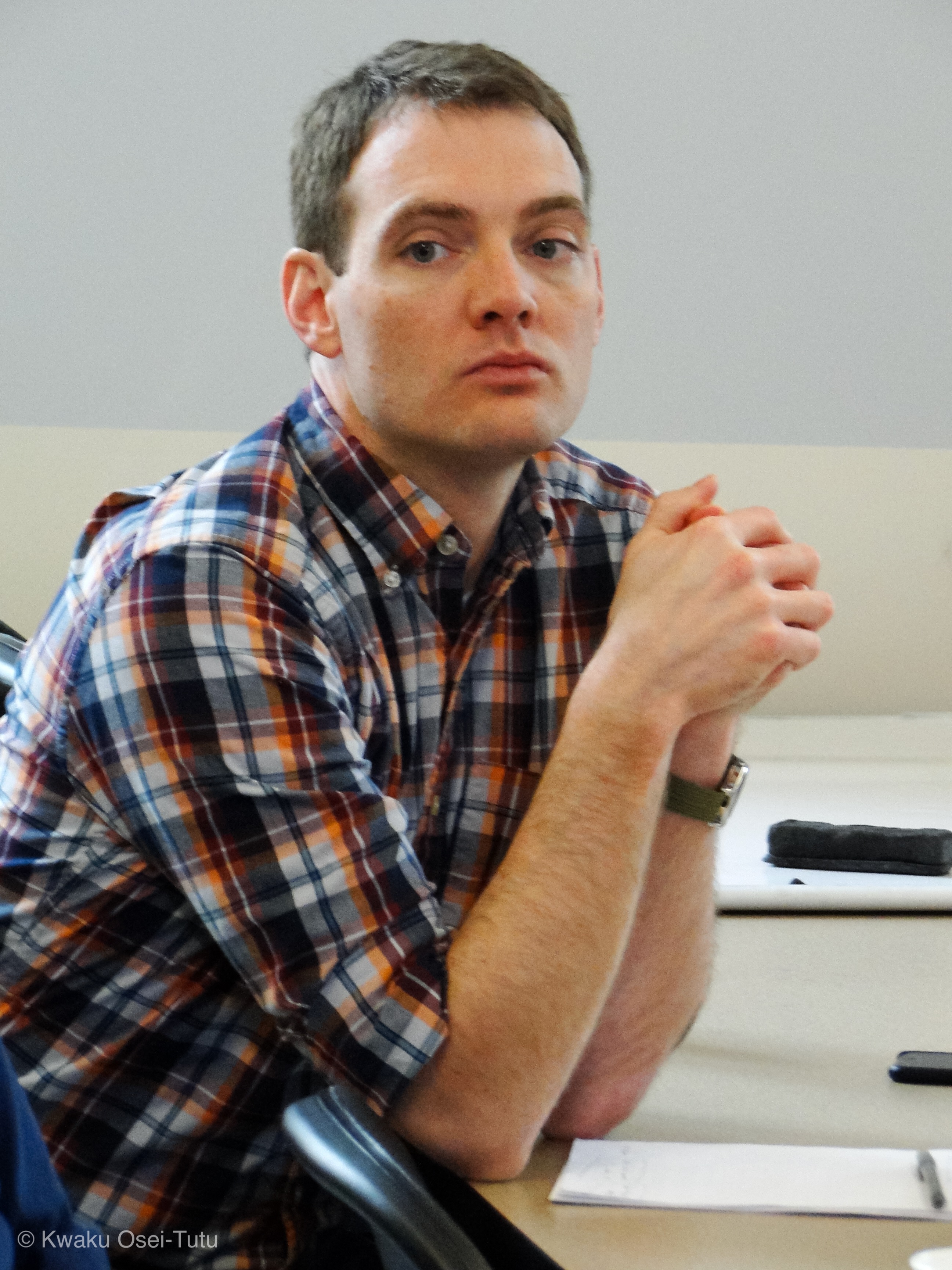
Jason Overfelt graduated from Purdue University as a member of the Indigenous and Endangered Languages Lab in 2007 with a BA in Linguistics and in 2009 with an MA in Linguistics. Jason went on to receive a PhD from UMass Amherst in 2015 and currently holds the position of Contract Assistant Professor in the Institute of Linguistics at the University of Minnesota.
This paper provides an account of the unexpected optionality of object marking in Tigrinya (Ethio-semitic; SOV) ditransitive constructions. The analysis proposes that, despite initial surface appearances, Tigrinya is an asymmetrical object language that employs two distinct ditransitive frames. It is argued that each frame is betrayed by the observed object marking pattern.
Sunny Park-Johnson
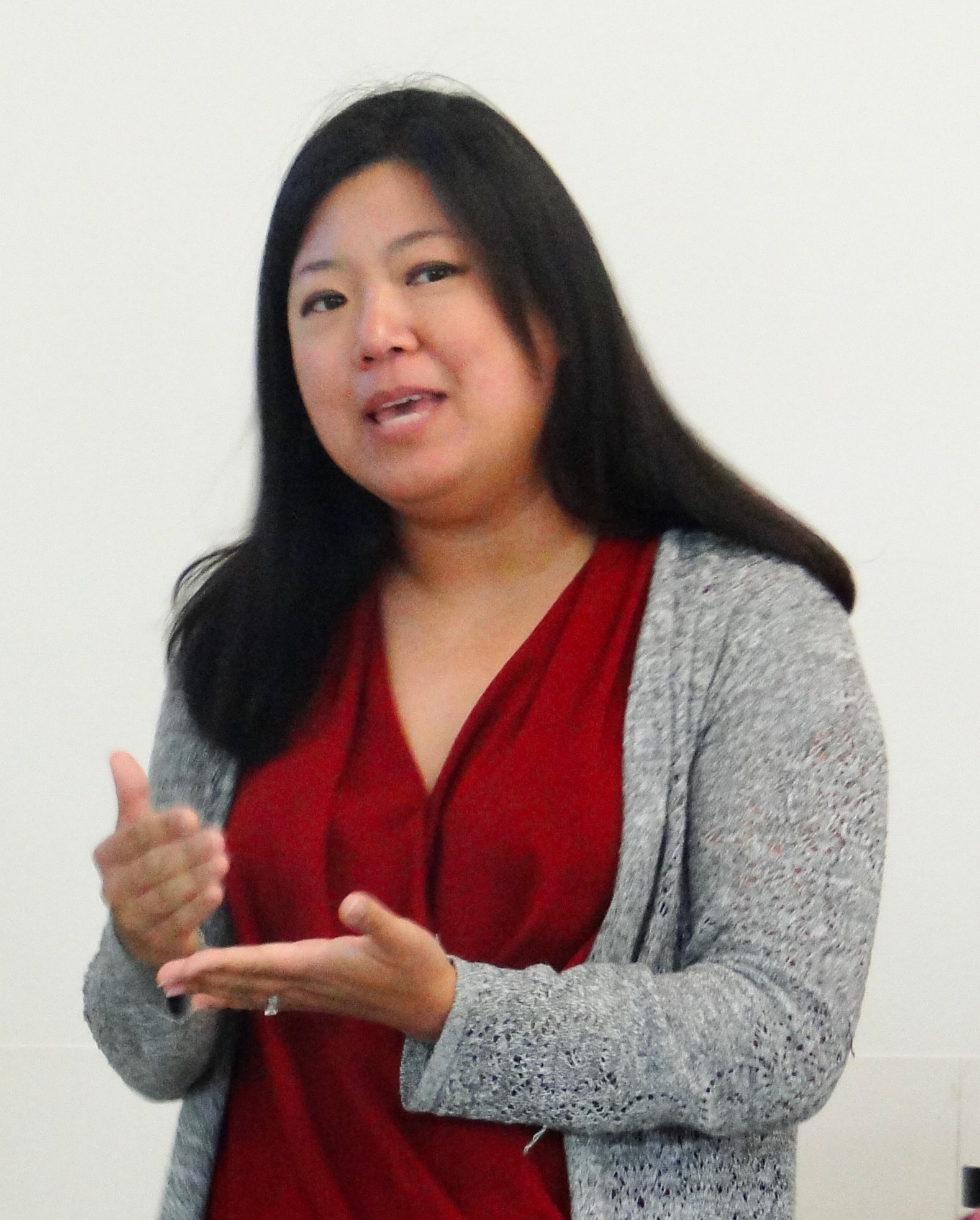
Sunny Park-Johnson earned her doctorate from Purdue University in 2011, and her dissertation focused on patterns of subject-auxiliary inversion development by Korean-English bilingual children. She is now an assistant professor in the Bilingual Bicultural Education Program in the College of Education at DePaul University. She co-founded and co-directs the Bilingual Language Development (BiLD) Lab. Her research interests include bilingual and early second language acquisition, code-switching, and morphosyntax of heritage languages.
- Paper: Early Bilingual Development in an Immersion Preschool Context
This study investigates the effect of Spanish immersion early childhood education on heritage speakers (HS) of Spanish and second language (L2) learners of Spanish. Findings indicate that children overwhelmingly use Spanish with peers but switch to Spanish when interacting with adults. Results also revealed that while there is a significant difference in Spanish production across the HLL and L2 populations (p< .001), when other factors aside from language background were entered into the model, dominance (p = .012) and exposure (p = .019) were more important predictive variables for Spanish production than home language background. This is particularly striking because it highlights the important role of early heritage and L2 education: regardless of the linguistic environment of the home setting, the immersion context of the school allows for both groups of students to excel not only in Spanish, but also in English. Finally, the findings indicate that despite the fear that parents and educators have regarding English loss, both HS and L2 children show evidence of English development despite the Spanish immersion context of their education.
(for a copy of the presentation, please email: sparkjoh@depaul.edu)
Ethan Myers
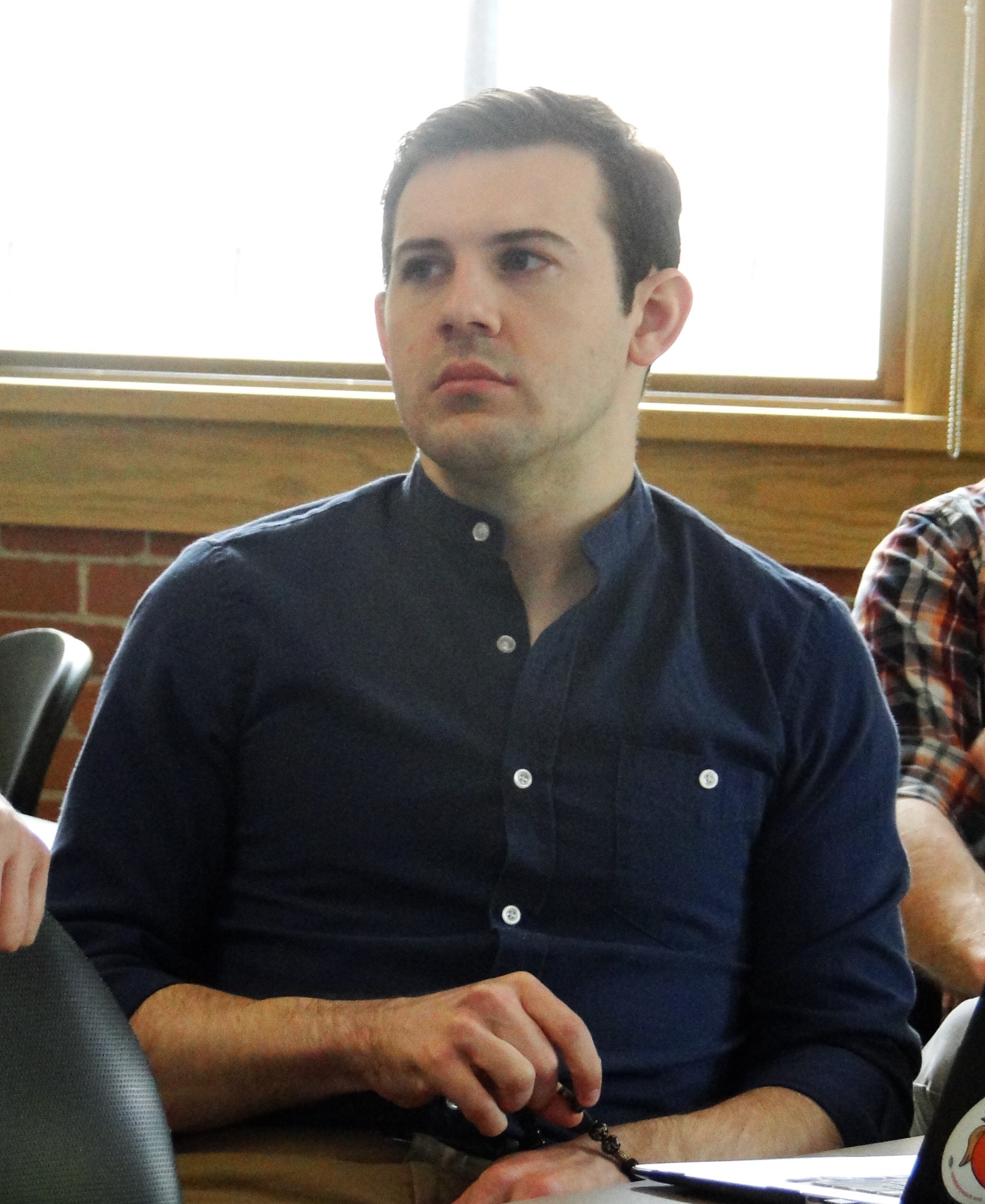
Ethan Myers is a former researcher from the Indigenous and Indigenous Language Lab who in the past worked on the Sumu-Mayangna meronymy system. Currently, Ethan is a fourth-year PhD at Northwestern University where he works on syntax and sentence processing, especially as it pertains to the study of clausal ellipsis.
This talk, also given at NELS49, deals with ellipsis in (Engish) If-clauses. We argue that this construction, which we call if-stripping, provides a counterexample to generalizations that embedded stripping cannot be licensed under an overt complementizer. We show that 'if' mirrors many properties of other complementizers (notably 'that') and that connectivity effects suggest the presence of silent clausal structure in the ellipsis site. These observations combine to suggest that the so-called Embedded Stripping Generalization (Wurmbrand 2017) casts too wide a net, and analyses of ellipsis licensing which try to capture this generalization (i.e. dynamic phase accounts) are not suited to capture the effects of if-stripping.
Amelia Shettle Mena
At Purdue University, I studied Indigenous language revitalization, specifically looking into factors that impacted revitalization in the United States. Through the IEL Lab, I did fieldwork in Nicaragua and worked alongside a team of Mayangna linguists to develop classroom and reference materials in the Mayangna language. I have since been building an education startup, Read With You, focused on 1) developing strong, student-focused, research-backed educational materials, 2) connecting students with experts by offering one-on-one online lessons with certified, licensed teachers, 3) bridging the divide between language researchers and language educators, 4) giving back to the community through company-wide donation projects involving staff, teachers, and students.
In this presentation, I would like to focus on what Read With You is doing to infuse linguistics into education to create a positive impact on language learners around the world. I’ll share updates regarding some on-going research projects and introduce the American Language Journal. Finally, I will end by coming full-circle with a look at how Read With You, by creating a team of publishers, linguists, and curriculum developers, is offering our skills to those engaged in language revitalization today.
Neda Taherkhani
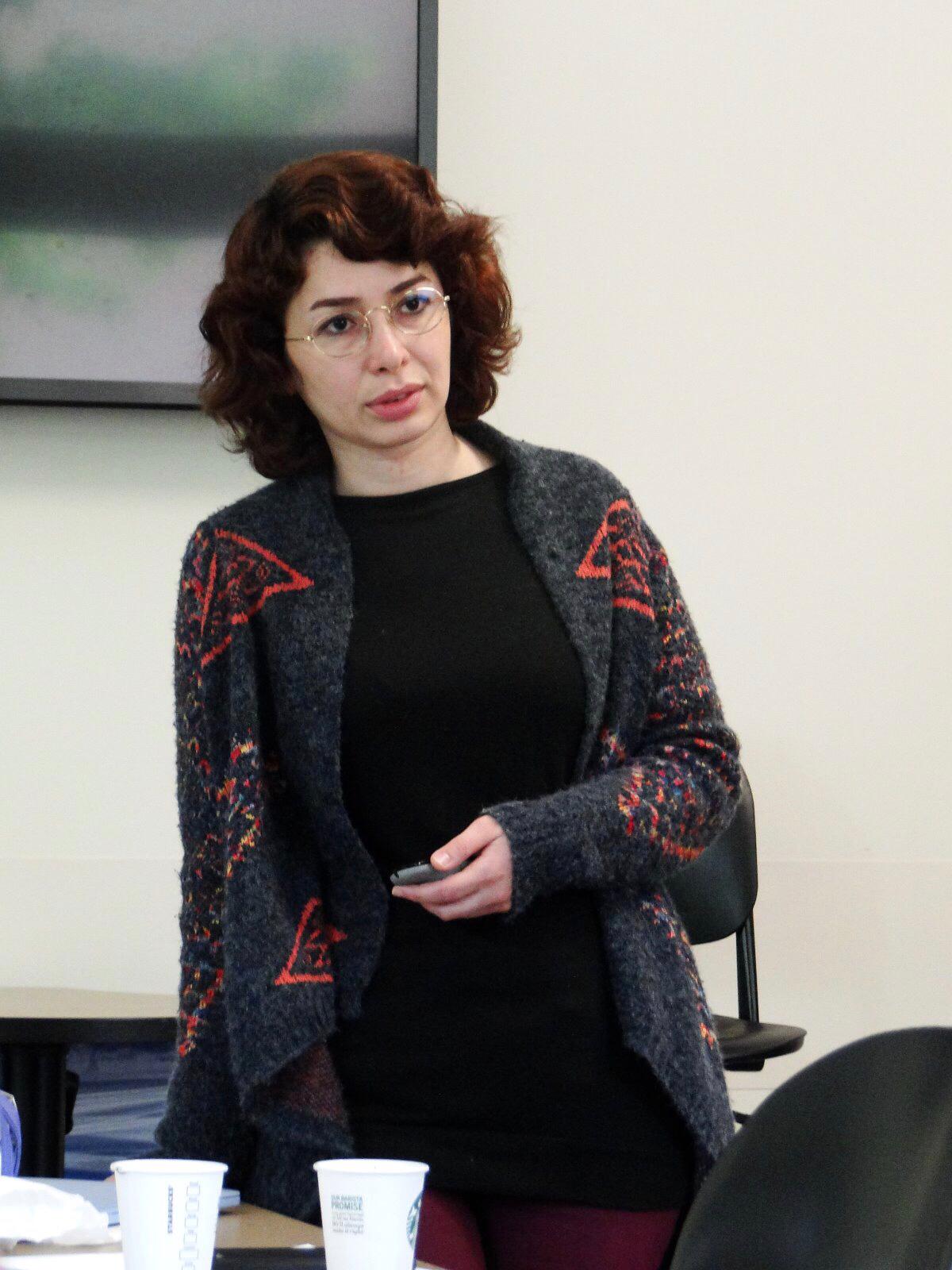
Neda Taherkhani holds a PhD in linguistics from Purdue University. Her specialization is Southern Tati, an under-described minority language of Iran. Neda’s PhD dissertation focuses on the syntactic structure of Motion Predicates in the Takestani dialect of Southern Tati through dealing with the sub-eventive decomposition of Motion Predicates into Path, Telicity, Resultative, and Agentive components. Neda’s dissertation has a secondary goal of contributing to the documentation of Southern Tati categorized as “definitely” endangered by UNSECO. Neda has been trained on language documentation techniques at IELLab since 2015. She has also taken advanced courses on language documentation and preservation at The Institute on Collaborative Language Research (CoLang 2018). Neda has been awarded the LSA fellowship for attending COLANG 2018, Purdue’s yearly PRF grant for writing her dissertation, the Certificate of Excellence in Research Award for 2018 & 2019 from the Office of Interdisciplinary Graduate Programs at Purdue, as well as several Lynn fellowships and PROMISE awards from the linguistics department at Purdue. Besides syntax, Neda has also worked on the phonological changes in Tati verb conjugations including vowel harmony, deletion, and assimilation. As a bilingual speaker of Persian and Tati, Neda has also been teaching Persian at the International Center in West Lafayette for two years.
This presentation is about the series of verbs expressing Motion Predicates (MPs) in the Takestani dialect of Southern Tati (Indo-European, Iranian, SOV, “definitely endangered”). This study hypothesizes that the verbal series expressing MPs in Tati are (a) mono-eventive and (b) made of a complementation structure. Five pieces of evidence are provided for the mono-eventivity of the verbal series expressing Tati MPs, which include (1) Non-compositionality of meaning, (2) Single inflectional spine, (3) Single agreement morpheme, (4) Single phonological phrase, and (5) Lack of pro. This study uses four pieces of evidence for the complementation structure of the verbal series used to express MPs, that include (1) Bound-variable test, (2) Polarity item test, (3) Subjunctive-under-negation test, and (4) WH formation test. These four tests rule out other structural explanations for the verbal series such as coordination and adjunction. The evidence provided in this study prove that the verbal series expressing MPs in southern Tati are instances of Serial Verb Constructions (SVCs).
Pin-Hsi Chen
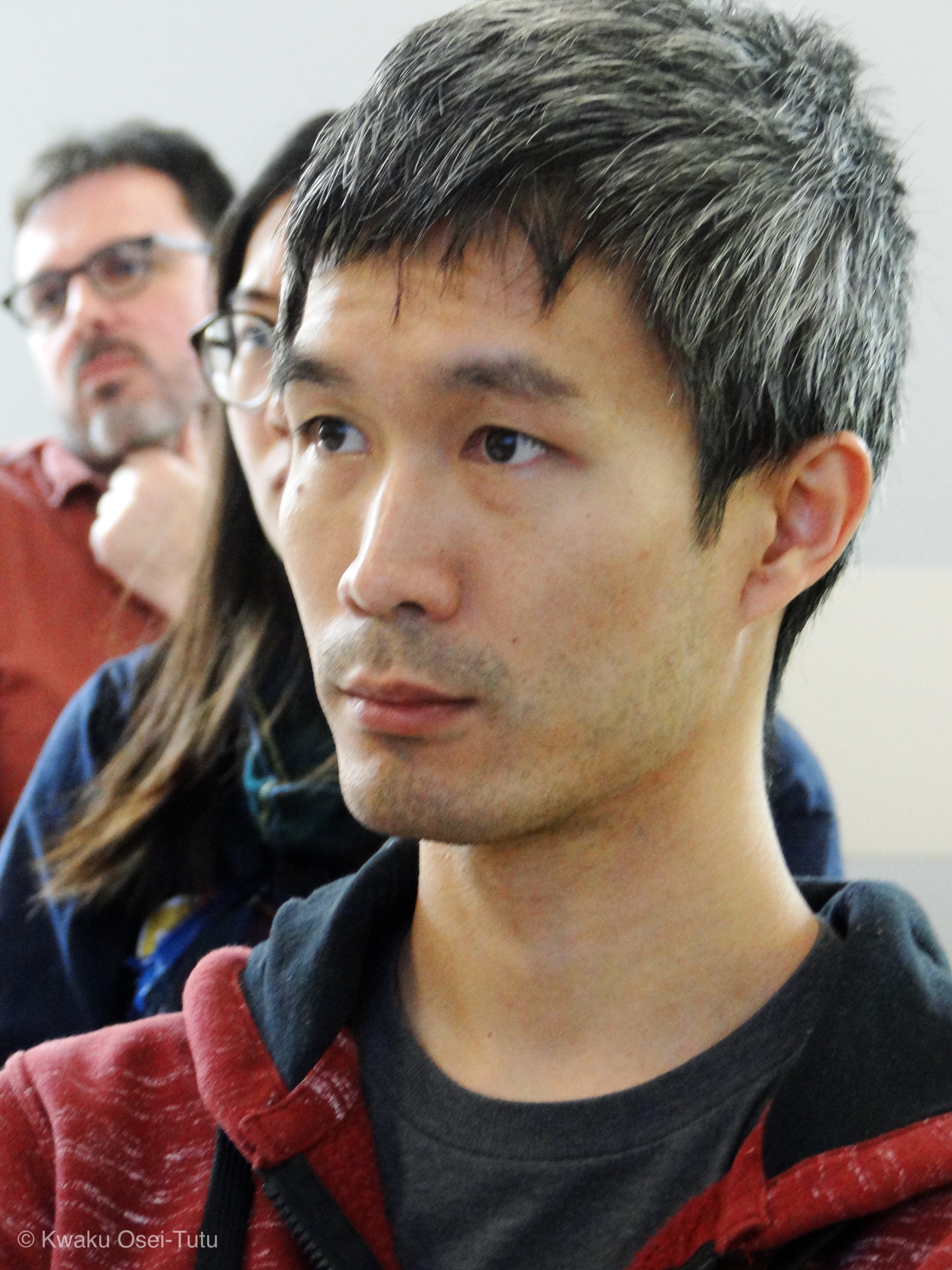
Pin-Hsi Chen is a fourth-year PhD student in the Linguistics Program at Purdue. Before coming to Purdue, he obtained an M.A. in Linguistics from the University at Buffalo. His current research focus is on how language in general and Mandarin in particular encode motion events—specifically, how grammar interacts with humans’ conceptualizations of time, space, and movement.
This study adopts the Exo-Skeletal model developed in Borer (2005) to analyze verbal classifiers in Mandarin as dividers of an event. Once an event has been divided into countable sub-events, a numeral (or quantifier) can appear in the structure to specify the number of these subevents, thereby giving the whole event a telic interpretation.
René Zúñiga Argüello
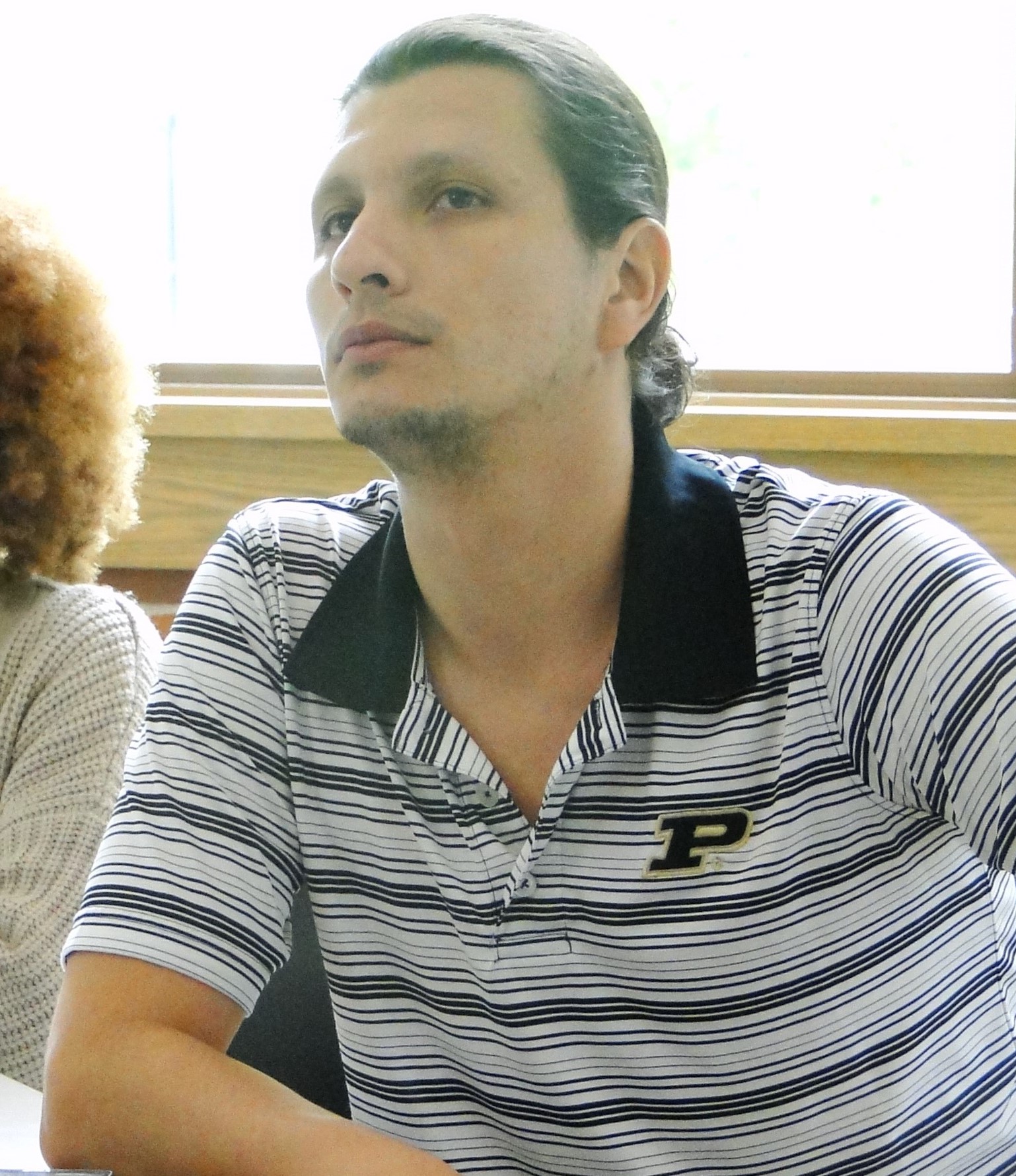
René Zúñiga Argüello is a second-year PhD student in the Linguistics Program at Purdue. Before coming to Purdue, he taught linguistics during eight years at Universidad Nacional, Costa Rica. Zúñiga has participated in different conferences and published studies on Limonese Creole structure and its situation. Currently, he is working at Purdue on a description of motion predicates for the language.
The following work presents an overview of Limonese Creole (Costa Rica) with regard to its socio-historical background and its current situation. It also presents some preliminary analysis on three aspects of its structure in terms of motion predicates -- the motion predicate structure, the path component and the telic component.
Brittlea Jernigan-Hardrick
Matthew Ball
Xuan Hu
Video Greetings
Some of the Alumni who couldn't make it for the reunion sent us video greetings. Click on the names below to listen to their messages.
Alexandra Pflug
Others
Many of our Alumni (who wished to be with us) but who were unable to make it, sent their regards:
Ager Gondra, Ph.D. (2013)
Alyson Eggleston, Ph.D. (2012)
Eric Follett, MA (2014)
Stacey (Carr) Pavelko, MA (2001)
Heather (Woodhouse) Dunphy
Corey Linkel
Nadia Arzberger

 Seated: Elena Benedicto; First Row (Left-to-Right): Sunny Park-Johnson, Amelia Shettle Mena, Brittlea Jernigan-Hardrick, Neda Taherkhani, Xuan Hu, Jessica González; Second Row (Left-to-Right): Kwaku Osei-Tutu, Pin-Hsi Chen, René Zúñiga Argüello, Jason Overfelt, Ethan Myers, Ricard Viñas-de-Puig. Also present was Matthew Ball (who is not in this picture).
Seated: Elena Benedicto; First Row (Left-to-Right): Sunny Park-Johnson, Amelia Shettle Mena, Brittlea Jernigan-Hardrick, Neda Taherkhani, Xuan Hu, Jessica González; Second Row (Left-to-Right): Kwaku Osei-Tutu, Pin-Hsi Chen, René Zúñiga Argüello, Jason Overfelt, Ethan Myers, Ricard Viñas-de-Puig. Also present was Matthew Ball (who is not in this picture).